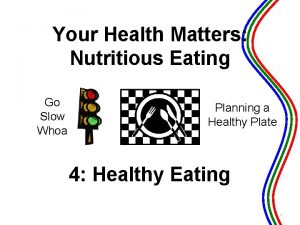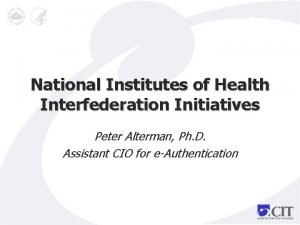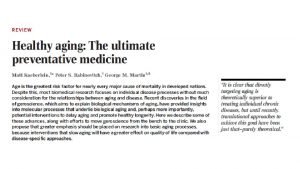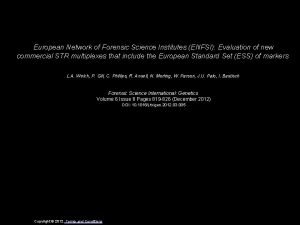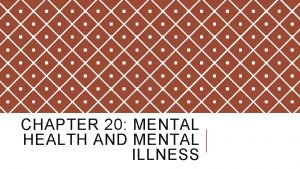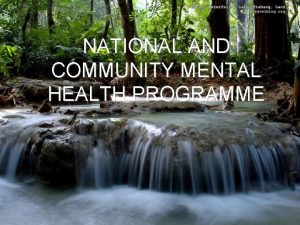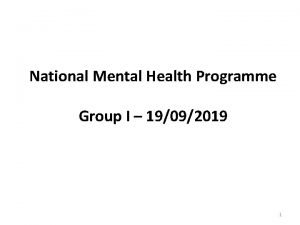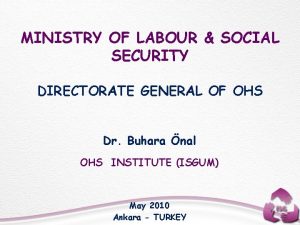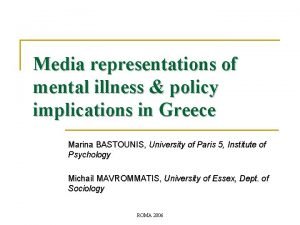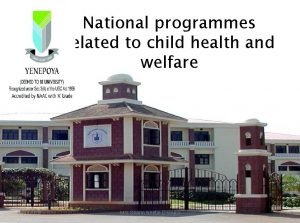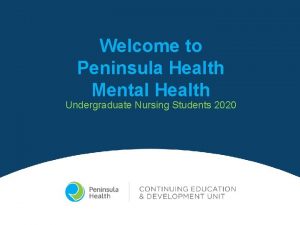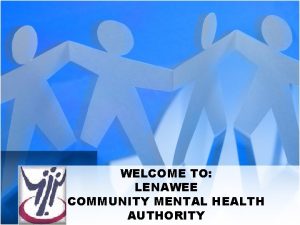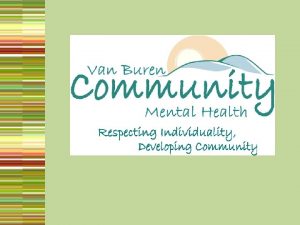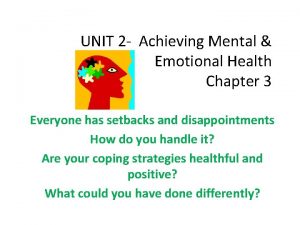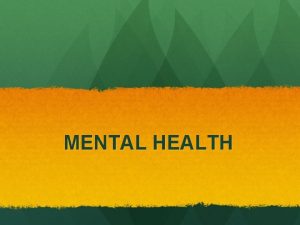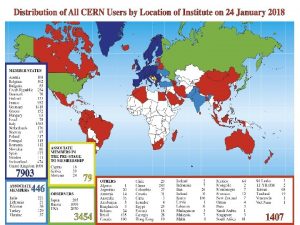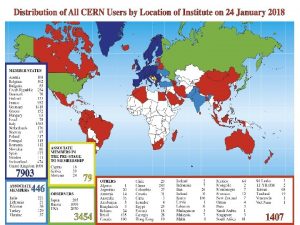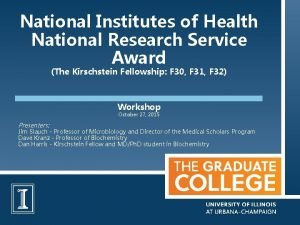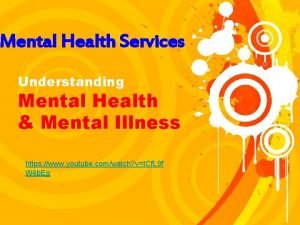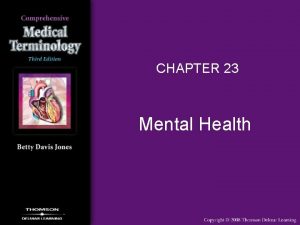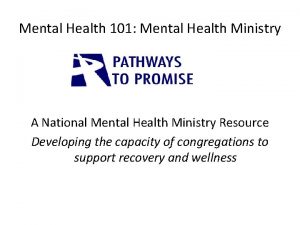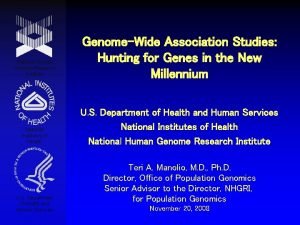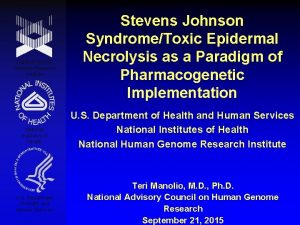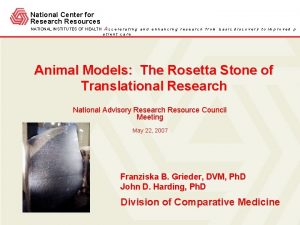MENTAL HEALTH US National Institutes of Health MENTAL



















- Slides: 19

MENTAL HEALTH

US National Institutes of Health • MENTAL HEALTH includes our emotional, psychological, and social well-being. It affects how we think, feel, and act as we cope with life. It also helps determine how we handle stress, relate to others, and make choices.

1999 US Surgeon General’s Report on Mental Health • MENTAL HEALTH as successful performance of mental function, resulting in productive activities, fulfilling relationships with other people, and the ability to change and cope with adversity.

CONCEPTS of MENTAL HEALTH according to the WHO in 2001

S-P-A-C-I-S • S-ubjective well-being; • P-erceived self-efficacy; • A-utonomy; • C-ompetence • I-ntergenerational dependence; and • S-elf-actualization of one’s intellectual and emotional potential, among others.

Subjective Well-being may be defined as one’s personal thoughts and feelings about one’s overall state of being. • MENTAL HEALTH denotes positive and healthy interpretations of a person’s selfconcept, and how a person feels about himself.

Perceived Self-efficacy • Is one’s perception of one’s value and worth, effectiveness, and ability in performing a task or activity. • When a person has a low self-esteem, s/he will feel hopeless.

AUTONOMY • Deals with one’s capacity to separate one’s identity from other significant persons-parents, lovers, special friends • The capacity for self-direction and having a clearly defined role identity

COMPETENCE • Is the perception of one’s capacity to effectively perform a function or activity using specific skills and knowledge, and achieving the desired results at a given time. • The underlying factor for competence is RESPONSIBILITY.

Because an individual who is competent will always assume full responsibility for the actions and results of his behavior. • A competent individual produces trust with those s/he deals with. • Accepts changes and resilient

INTERGENERATIONAL INTELLIGENCE • It refers to the relationships between individuals who belong to different generations but may be living separately as independent, autonomous persons during a specific period of time. “Empty nest”

Self-actualization of one’s intellectual and emotional potential • Maslow identified the key characteristics of self-actualized individuals: • They have acceptance of their reality and compassion to help solve problems of other people • They are spontaneous with their thoughts and behavior and open to change

• They have a strong need for privacy and solitude as they continue to strive in fulfilling their potentials. • They are highly appreciative of events and people and the wonder of the things around.

Mental health and well-being model, developed in 1991 by Witmer and Sweeney • FIVE LIFE TASKS: • ESSENCE OR SPIRITUALITY • WORK AND LEISURE • FRIENDSHIP • LOVE • SELF-DIRECTION

WHEEL OF WELLNESS or the twelve sub tasks sense of worth Self-care stress management gender identity Emotional awareness and coping Problem solving and creativity Sense of humor Nutrition Physical exercise Sense of control Realistic beliefs cultural identity

• RESILIENCY • The capacity to establish and maintain balance and well-being in the face of adversity. • The ability to get back on one’s feet after a disaster or crisis. • ADAPTABILITY • The capacity to adjust to changes necessary for one’s survival and balance.

Fact or Bluff 1. Competence refers to the relationships between individuals who belong to different generations but may be living separately as independent, autonomous persons during a specific period of time. 2. Subjective well-being refers to one’s personal thoughts and feelings about one’s overall state of being.

3. Intergenerational intelligence deals with one’s capacity to separate one’s identity from other significant persons-parents, lovers, special friends. 4. Adaptability is the ability to get back on one’s feet after a disaster or crisis. 5. Adaptability is the capacity to adjust to changes necessary for one’s survival and balance.

Please do the activity on page 53 in your journal notebook.
 National institutes of health
National institutes of health National institutes for health
National institutes for health Nih institutes and centers
Nih institutes and centers Best jee coaching in agra
Best jee coaching in agra Wisconsin institutes of discovery
Wisconsin institutes of discovery European network of forensic science institutes
European network of forensic science institutes Top bank coaching in hyderabad
Top bank coaching in hyderabad Chapter 20 mental health and mental illness
Chapter 20 mental health and mental illness Mental health coping skills jeopardy
Mental health coping skills jeopardy National mental health programme objectives
National mental health programme objectives National mental health programme
National mental health programme Conclusion of health and disease
Conclusion of health and disease Conclusion of national mental health programme
Conclusion of national mental health programme National intervention programme for mother and child
National intervention programme for mother and child Mental sub factors national 5 pe
Mental sub factors national 5 pe National unification and the national state
National unification and the national state Peninsula
Peninsula Lenawee community mental health authority
Lenawee community mental health authority Van buren county cmh
Van buren county cmh Intentional use of unfriendly or offensive behavior
Intentional use of unfriendly or offensive behavior
